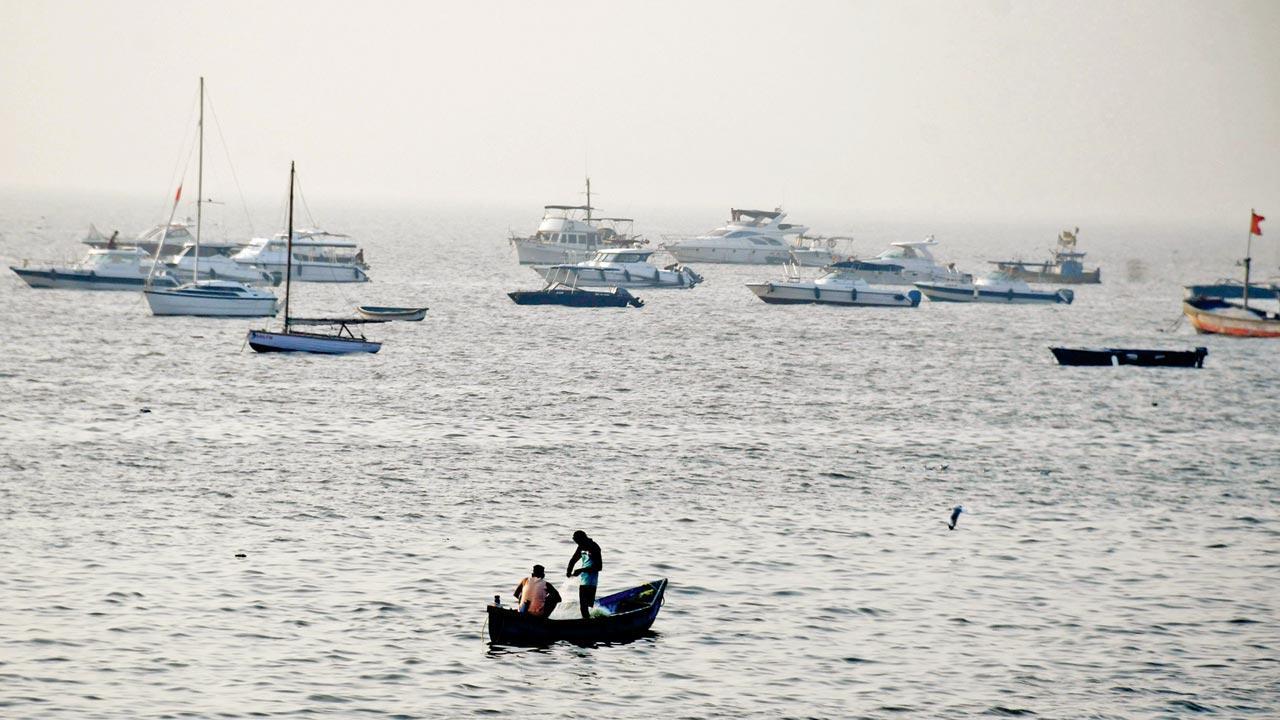Overall air quality drops from 152 (moderate) in afternoon to 235 by evening; meteorologists say wind from the sea helped ease pollution, but cold weather adding to woes

Boats amid slight fog near Gateway of India on Sunday morning. Pic/Ashish Raje
Mumbai seems to be witnessing a see-saw phenomenon when it comes to the air quality. While Saturday and early Sunday saw the Air Quality Index (AQI) in the ‘moderate’ category, bringing in some relief after almost a week, the AQI again climbed to the ‘poor’ category by Sunday evening.
Experts have attributed this fluctuation in the air quality to the speed of winds blowing from the sea that eased the rising pollution levels.
ADVERTISEMENT
The System of Air Quality Weather Forecasting And Research (SAFAR) on Saturday recorded an overall AQI of 152 (moderate) in the city, a drop from 200 to 250 recorded through the past week. Till Sunday afternoon, it remained at 159, but it shot up to 235 (poor) by evening. As per SAFAR’s forecast, AQI will hover around 200 to 218 on Monday.
Also read: Mumbai's air quality continues to remain in 'moderate' category, AQI at 149
Seven of the total 11 air quality monitoring stations (including Navi Mumbai) on Sunday evening recorded poor AQI.
The reason for the sudden reduction in the intensity of pollution on Saturday and early Sunday, SAFAR Founder-Director Gufran Beig said, was the wind that gushed in from the sea at high speed. Mumbai’s proximity to the sea and breeze offers an advantage “over Delhi”, he said.
Beig added, “Mumbai is surrounded by the ocean on three sides, hence surface winds are typically stronger and wind speed is very high. Also occasionally, the wind will reverse direction. When breezes come from the oceanic side, they are clean and thus sweep all of the city’s pollution, improving AQI. However, when they come from the opposite direction, AQI deteriorates. Whether it is summer or winter, Mumbai has the advantage of cleaner wind from the ocean.”
“After recording a moderate level on Sunday, AQI deteriorated to poor in the evening. This was due to a reduction in the speed of the wind coming from the sea. At the same time due to colder conditions, the local wind is stagnant. Low wind speeds prevent local pollutants from being adequately dispersed over or swept out of the city, thus dragging AQI to poor level,” Beig said.
Localised pollution like garbage burning and vehicular pollution are factors causing frequent deterioration of air quality in a selected few areas in the financial capital and adjoining areas such as Navi Mumbai.
Since November 2, Navi Mumbai has been recording AQI above 300 (very poor). On November 2, Navi Mumbai’s AQI was 346. After recording a slight improvement on November 3 with an AQI of 245 (poor), it was back to 332 the next day. The satellite town’s AQI jumped to 347 on November 10. On Sunday, however, it improved to 166 (moderate).
AQI on Sunday evening
Mumbai overall: 235 (poor)
Bhandup: 107 (moderate)
Colaba: 211 (poor)
Malad: 296 (poor)
Mazgaon: 286 (poor)
Worli: 106 (moderate)
Borivli: 221 (poor)
BKC: 200 (poor)
Chembur: 169 (moderate)
Andheri: 225 (poor)
Navi Mumbai: 166 (moderate)
 Subscribe today by clicking the link and stay updated with the latest news!" Click here!
Subscribe today by clicking the link and stay updated with the latest news!" Click here!







